5 'Based On A True Story' (BS) Movies
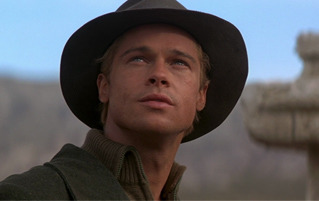
Pretentious film snobs ( and us, sometimes) are quick to call bullshit when a "based on a true story" movie turns out to be filled with lies. But let's face it, no one wants a movie to get too realistic. We depend on Hollywood filmmakers to omit the depressing real-life bits and just stick to the good stuff -- if we wanted to fill our faces with candy and soda while watching something sad, we'd stay home.
That's why, as we've covered once before, it's surprisingly common for popular movies to leave out shockingly disturbing facts, like how ...
Rocky -- The Real Rocky Fought a Wrestling Bear, Went to Jail on Drug Charges

Unless you're Russian or a sentient piece of raw meat hanging from a hook, you probably love famed fictional boxer Rocky Balboa. Rocky has moved countless viewers over the years to follow their dreams. What could be more inspiring than a regular Joe from Philly who goes on to become world champion and punch the physical embodiment of communism in the face?
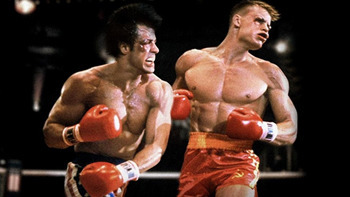
The punch was so strong, Hugo Chavez spontaneously dropped dead 28 years later.
As Cracked readers already know, the inspiration for the character came from Chuck Wepner, a real fighter whose bout with Muhammad Ali gave a young Sylvester Stallone the idea for the original film. Luckily for cinema history, Stallone didn't take any cues from Wepner's further career for more Rocky adventures, because then the franchise would have inevitably turned a lot sadder than it did. Instead of going on to gain international fame or facing formidable opponents like Ivan Drago and Mr. T, Wepner's second-most-notorious fight after the one with Ali was this:
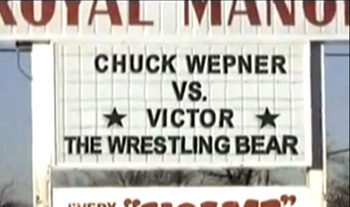
All the boxing bears were busy that night.
You might think that "Victor the Wrestling Bear" was simply a nickname for some large, hairy gay man, but nope: it was an actual de-clawed, nearly blind grizzly that Wepner sparred with for the entertainment of a bunch of weirdos. Looking at photos of the fight will make you feel bad for Wepner, the bear, and humanity in general.
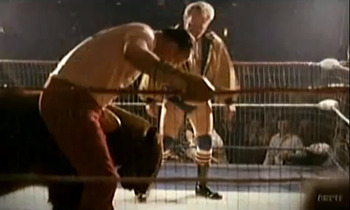
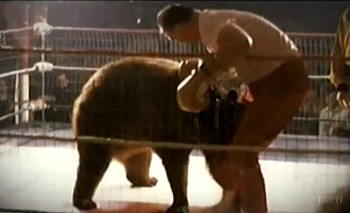
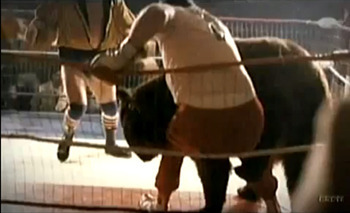
Technically, it was bear knuckle boxing.
The fight only lasted for five minutes before Wepner needed to call for help. Uninterested in stealing picnic baskets or honey pots, the bear was actually going to horribly murder him. And while Ali never demanded a rematch like Apollo Creed did in Rocky II, the bear apparently did. Victor and Wepner faced off again a year later, which went even worse: Wepner was immediately tossed over the ropes, landed on a dinner table, and quit the fight. After that, he somewhat understandably spent half the '80s in a drug-induced stupor, until he was busted with a small mountain of cocaine. According to the book Operation Bullpen, in 2002, Wepner was busted again by the FBI for selling fake Ali autographs.
Also understandably, Stallone didn't use any of these anecdotes in any Rocky movies, although if he had, they would have made for a Rocky V that would have won approximately all of the Oscars.
Seven Years in Tibet -- Brad Pitt's Character Was Exposed as a Former Nazi

Seven Years in Tibet is a charming, picturesque true story of an Austrian mountaineer called Heinrich Harrer (Brad Pitt) who travels to Tibet and ends up tutoring the young Dalai Lama. How many of us can say we met one of the greatest religious leaders in the world when he was at the height of his awkward boner years? But the movie left out the fact that Harrer also rubbed shoulders with other famous figures of the 20th century. Like this one here:
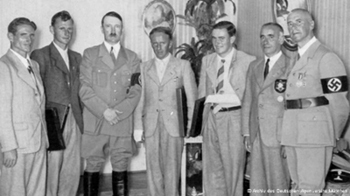
Yes, mountaineering fans, that is the Fritz Kasparek.
That's Harrer on Adolf Hitler's right, and we don't wanna know what he's doing with his missing hand. It turns out that befriending an Austrian drifter in the '30s and '40s can lead to some nasty surprises. In the movie, which is based on Harrer's autobiography, Brad Pitt's character is sent to a British POW camp just for having German citizenship, even though he hates the Nazis. In reality, he was a Nazi. And he wasn't just dabbling in Nazism because it was the style at the time -- he was an actual member of the SS, with a rank equivalent to that of a sergeant. Include that little detail, and this turns into a completely different "POW on the run hides in Tibet" movie.
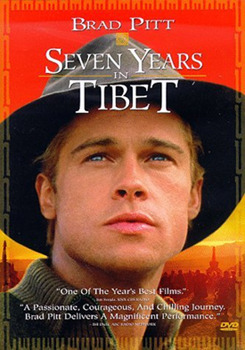
Original Title: Seven or So Years 'til Shit Blows Over in Europe.
Harrer even had to ask Heinrich Himmler for permission before he could marry, and wore his Nazi uniform to the ceremony. If you ever decide to propose to someone and get a bit nervous, remember that at least you don't have to get permission from the head of the goddamn Third Reich.
Most of this stuff only came to light in 1997, right before Seven Years in Tibet was released. The director said he did suspect Harrer had a "possible connection" to the Nazis, but not enough to look into it at all because, you know, it would have totally ruined his film. It's worth mentioning that Harrer was never linked to any war crimes, and that the Dalai Lama remained his friend even after finding out this made him Hitler's twice-removed pal.
Dennis the Menace -- The Real Dennis Had a Horrible Childhood, Went to Vietnam, Got PTSD

Dennis the Menace is a classic series of comics, cartoons, and movies all based on the idea that kids are terrible, and they'll make your life a living hell if you let them.

"In our house, because we inexplicably keep letting him in."
In the comics, every adult character was constantly being terrorized by the antics of this adorable proto-Bart-Simpson, but in real life, it was kind of the opposite. The character of Dennis was based on Dennis Ketcham, son of Hank Ketcham, the creator of the strip. So let's start the long list of injustices committed against the real Dennis with the fact that his dad modeled a world-famous character after him, surnamed him "the menace," and in general made him annoying as fuck.
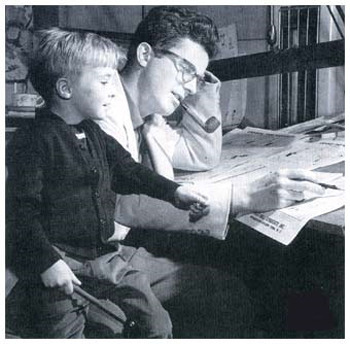
"Sure pal, I'll play with you as soon as I finish this picture of a kid who WON'T STOP BUGGING HIS DAD."
While Ketcham was getting rich from his idyllic, fictionalized son, his flesh-and-blood one had to deal with some shit way more intense than getting caught sneaking cookies before dinner. When Dennis was only twelve, his mother, an alcoholic, died of a drug overdose while in the process of divorcing his father. The family then moved to Switzerland, but when Dennis started having trouble in school, Ketcham shipped the kid off to a boarding school in the U.S. while he remained in Europe with his new wife.
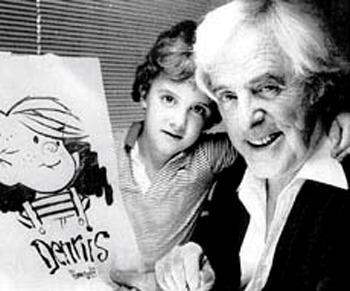
And a replacement Dennis, apparently.
And then Dennis got older, and he was finally able to move on ... to fight in Vietnam, where the Viet Cong presumably taunted him with "Hey Mister Wiiiilsooon!" chants. Fortunately, he survived; unfortunately, he suffered from Post-Traumatic Stress Disorder, and also the ongoing stress of being unable to open a newspaper without risking seeing the pop culture icon who hijacked his childhood.
As a result of everything we said, Dennis became estranged from his father, who continued drawing the wacky adventures of happy, mischievous Dennis for decades. Luckily, that particular Dennis never ages, so we were spared a movie where he has to go fight in 'Nam.
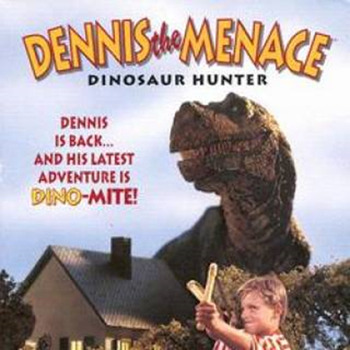
Unless there was some dark symbolism that we missed here.

The Hero of Hotel Rwanda May Have Been Exploiting His Guests

Hotel Rwanda is a powerful story of a hotel manager's frantic efforts to harbor and save the lives of a number of refugees during the Rwandan genocide -- it's basically Schindler's List combined with a pretty fucked up episode of Fawlty Towers.
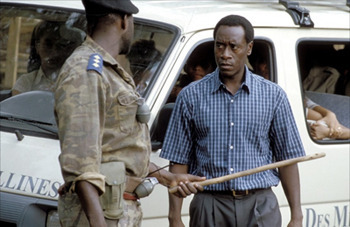
"Don't mention the war? How could I possibly not mention the war?!"
The hotel manager, Paul Rusesabagina, has been widely hailed as a hero, garnering the highest honor anyone can receive: being portrayed by Don Cheadle, who is awesome. However, there are people who disagree with the movie's depiction of its altruistic protagonist ... including some of the ones he supposedly saved. A group of Rwandan genocide survivors assert that Rusesabagina exaggerated his own heroism, and was in fact charging his guests for safe haven in the hotel. In that case, we hope they didn't order any adult films or open one of those tiny jars of cashews.

"That'll be $200 for not getting killed, and $50 for the fun size Snickers bar."
One of the actual residents of the hotel, Pasa Mwenenganucye, claimed that people who couldn't pay to stay were kicked out, and called the film a "basket of lies." Similarly, the head of the UN's peacekeeping force in Rwanda at the time, Canadian Romeo Dallaire, didn't refer to the Rusesabagina controversy directly, but called the movie "junk." Though to be fair, he may have been pissed off that the character based on him was played by former Sexiest Man Alive / current bloated, demon-voiced mess Nick Nolte.
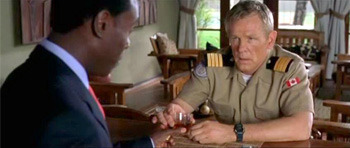
"Why couldn't Don Cheadle play us both? Why couldn't Don Cheadle play everyone?"
The backlash was so bad that Rusesabagina was pressured into cancelling an appearance at a Canadian festival by members of Toronto's Rwandian community, who accused him of being "genocide revisionist and denier." So they didn't like the movie either, we take it. All of this has to be taking its toll on its Metacritic score.
It should be noted that Rusesabagina has denied all of these accusations, and stands by the Hollywood version, in which the guy who played War Machine doesn't threaten to send refugees to their almost-certain death if they can't afford a hotel bill. In his words: "No survivor has said, 'He charged and kicked me out for not paying.'" That ... doesn't sound as good as it did in your head, dude.
Munich Ignores Multiple Civilian Murders

Munich is a thought-provoking and riveting thriller about Israel's response to the murder of 11 of their athletes and coaches at the 1972 Munich Olympic Games. The movie asks if we lose some of our humanity when we go after our enemies, because 9/11 and stuff. Some of Israel's supporters didn't appreciate this, and called out director Steven Spielberg for being too critical to the country in Munich -- even though it toned down the fucked-upness of the real events.
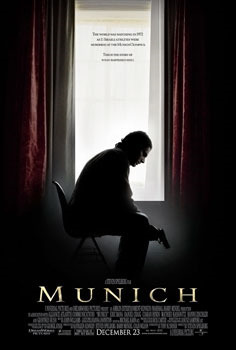
For starters, those future aliens who rescue Eric Bana at the end don't really exist.
The plot centers on the members of an elite squad of Mossad agents charged with tracking down and assassinating members of the group responsible for the Munich murders, Black September. It sounds like an emo band, but was a Palestinian terrorist organization. Even though the entire point of the film is addressing the moral ambiguity of sacrificing civilians in pursuit of these targets, it actually ignored some of the biggest clusterfucks in the real mission.
For instance, at one point, the group found one of the terrorists in Norway as he was exiting a bus with a pregnant woman, and killed him. The authorities tracked down the agents' license plate number and arrested them, but at least they got that filthy terrorist first, right? Nope. They shot the wrong guy. He wasn't even Palestinian -- he was a Moroccan waiter. The pregnant woman was his wife.
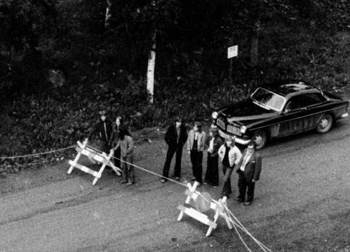
"Oh man, our faces are gonna be soooooo red when this gets out."
That's less like Munich, and more like a super bleak Police Academy movie. An even more Police-Academy-esque moment that didn't make it into the movie: one hit was executed with two of the agents dressed in drag -- one of whom, Ehud Barak, went on to become Prime Minister in 1999.
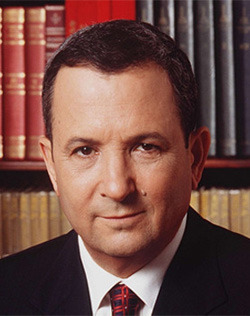
According to our computer simulation, he looked exactly like Bette Midler.
In the movie, the mission just kind of fizzles out in a haze of disillusionment, whereas in real life, it ended with the Mossad agents successfully bombing the mastermind of the Munich killings, along with his four bodyguards. And three innocent bystanders. Oh, and they injured 16 people who happened to be nearby. Shit, if anything, Israel should be sending Spielberg money for cleaning up their reputation, not hurting it.
For more Hollywood bullshit, check out 7 Movies Based on a True Story (Are Shockingly Full of Crap). And then check out 26 Awesome True Stories Behind Famous Movie Locations.